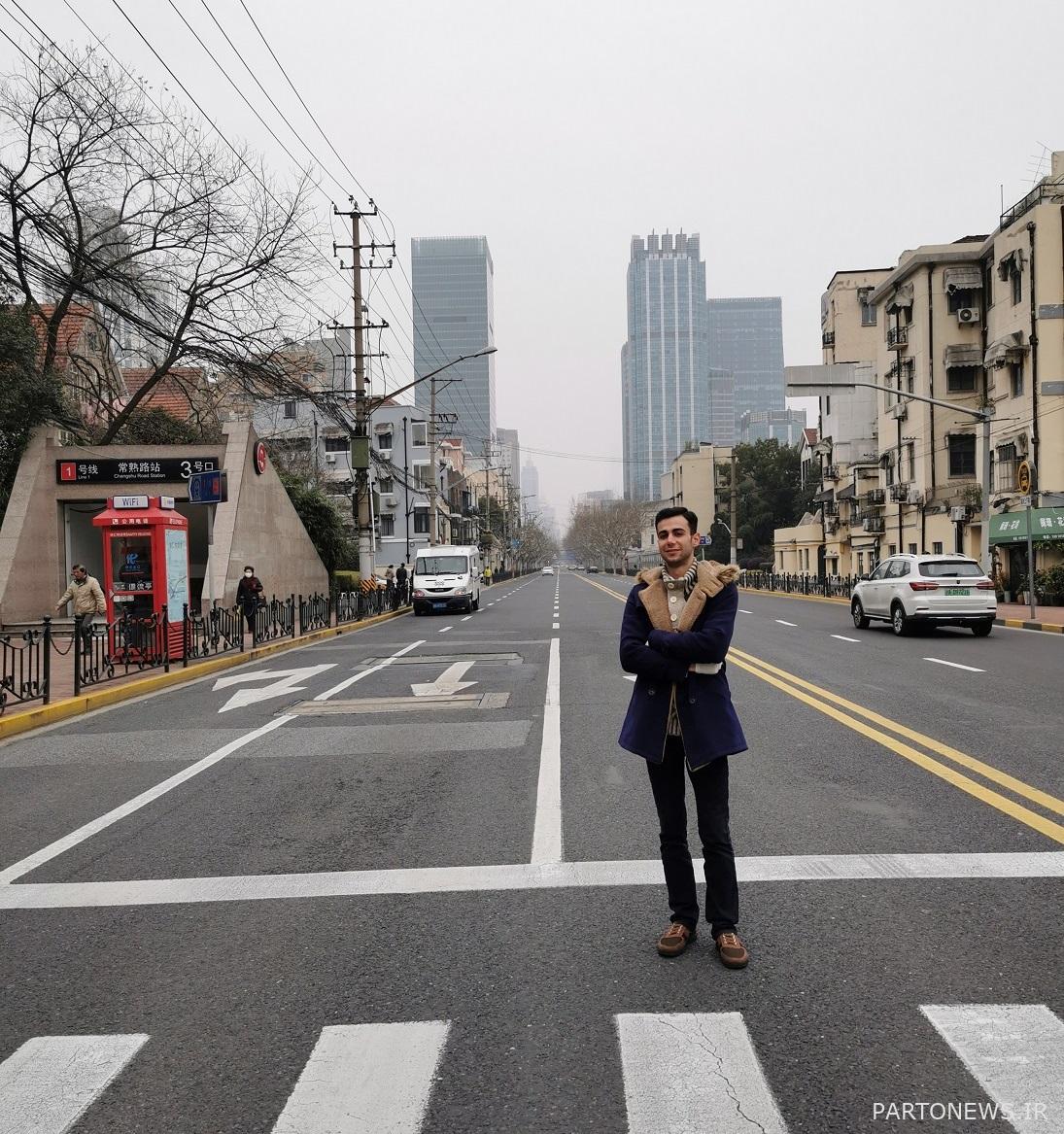Think differently! – Ecomotive

With the formation of the startup ecosystem and the development of this space, startups were not limited to the field of information technology and opened their way to other fields, including health. The field of health is old, but the digital health sector is completely new and has a high potential for growth, and various people and organizations have recently entered this field. Follow Ecomotive’s conversation with one of the experts in this field:
Introduce yourself and tell about your work background:
My name is Daniyal Hami, born in 1371, I am a graduate of medical engineering, bachelor degree and also a student of general medicine, and I was an honorary professor of Gilan University of Medical Sciences for about two years. During that time, I gave 35 lectures and trained about 900 medical staff in the field of startups in the field of medicine and health. they stop; Our project was also among the projects that were stopped when the president of Gilan University of Medical Sciences changed. After that, I studied medicine at Zhejiang University in China. This university is the 53rd university in the world and the 6th university in Asia in the QS ranking. On the other hand, China is the birthplace of Asian startups, and the largest Asian startup is AliExpress in China. At first, we organized the first medical and health startup weekend in the north of the country, which was a one-year activity and was very well received, during which the minds of medical students were introduced to the concepts of startups, and the result was 12 teams that are currently I am also in contact with most of the teams.
What challenges do medical science startups face?
One of the challenges is that it is difficult to bring people from the field of medical sciences into the startup field. This is because the working environment of these people has better conditions than engineers and other fields and they do not have to worry about finding a job after graduation. The platform for the formation of “startups” also became a trend due to the poor working conditions of engineers in our country, and on the other hand, since the success rate of startups is below 5%, and there is a 95% chance of their failure, and only 1% of them lead to income. As long as they get there, people in the field of medical sciences often don’t sacrifice themselves for that 5%, but those who enter this field face a pristine environment. Currently, thanks to Corona, people in the field of medical sciences got to know the startup environment, and this situation proved that startups are inevitable; The Zoom application was also one of the apps that became a trend during the Corona period and its shares increased 5 times. Even recently, when I was reviewing the startups launched during the Corona period, I came across a startup that has created a virtual lab space that is similar to what is currently being done at Zhejiang University where I am studying. It has been implemented and we do all the tests with a laptop; Because China has not decided to open its borders for students at the moment and we have been working online for about a year and a half.
Why did you enter the startup ecosystem?
“Geography” is very important in choosing a space; I am originally from Rasht and I chose Qazvin Azad University to study. This university is the host of RoboCup Iran. I was a member of a research center at the university, and when the word “startup” was just being formed in Iran, our university was one of the pioneers in this field. In 1991, when this concept was just being formed, I was the translator of several foreign mentors from European countries such as Germany, the Netherlands, etc., and my fluency in English made me one of the first people to be familiar with these concepts. . A little later, several events and startup weekends that we held, unfortunately, the word “startup weekend” was opposed and the word “startup camp” was suggested instead, but in the end the concept did not change. For some time, I worked as a researcher at Tehran University of Medical Sciences, and there I got to know more about medical sciences, and since I had previously studied in the field of medical engineering, I came to the conclusion that it is necessary to have a relative knowledge of both engineering and I want to be a doctor, and in the two years I was working as an honorary professor at Gilan University of Medical Sciences, I came to the conclusion that in order to do an effective job in this field, I should also study medicine.
What was the theme of the startup weekend you organized in the north of the country and how many people participated in it?
About 168 people registered in that event, which was much more than we imagined; Because in startup weekends, startup teams are usually between 5 and 7 people, and the number of people registered in that startup weekend was so large that there was not enough space for people, that’s why we increased the number of team members and finally there were 12 teams. . During that startup weekend, at my suggestion, we also enrolled some students from two schools so that they would be familiar with these concepts during their student days. The event was held over three days and prizes were awarded and mentoring services were provided to the teams. Since we also had guests from Tehran University of Medical Sciences, a confrontation was formed between people from the field of medical sciences and people from the field of startups, and this confrontation made people from the field of medical sciences realize the effective presence of startups in the field of medicine and therapy, and on the other hand, IT people believed that startups should only be in IT, so it took a lot of time for these two groups to reach a consensus, and of course, this problem still exists, and IT people believe that it is necessary to start a Startup, by increasing the scope of the market, costs will be reduced; But these concepts are different in medical sciences because there are biotech drugs whose manufacturing process is slightly different from other drugs and sometimes in the manufacturing process of these drugs they use engineering technology such as artificial intelligence and cut the path to that goal in half. The costs are also halved, as a result, a competitive environment is formed, which prevents the hoarding of drugs and as a result, price increases, and even the creation of this environment ends up benefiting the patient, and this is a miracle that “startup” for the pharmaceutical industry. It brings benefits to both the producer and the customer. In the prosthetics industry, artificial organs are formed by gluing different parts; Screwing organs increases the cost and weight of the organ, which currently 3D bioprinters have solved this problem and a general print is obtained with fewer screws and, as a result, less weight and cost. achieve results; These are the things that happen in startups; Currently, more than 200 startups in the field of health are operating in different sectors in the country, which is a very strange statistic because there are many challenges in this field, for example, startups in the field of medicine are not allowed to distribute medicine anywhere other than pharmacies. ; Therefore, startups in other fields are definitely much higher than this number.
What is the difference between businesses that operate in this field under the title of “startup” and businesses that operate under the title of “knowledge base”?
In order to become knowledge-based, it is necessary to register the company; Generally, it is not recommended for startups to register a company at the beginning because it creates new conflicts for it. In most cases, it takes 24 to 36 months for a startup to reach the break-even point, after that it reaches the income generation phase and we We do not recommend to register the company before this date. After this period, the registration of the company, which was done, from the point of view of the scientific vice president, there are factors that must be observed in order for the company to enter the knowledge-based stage. Mentoring services are provided, and the mentors often advise them that once you know the market and generate income, move towards becoming knowledge-based so that the company registration process is not complicated; Because the foundation of knowledge has several stages of judging, and the last stage is the final judging by the Scientific Vice President. Although knowledge base also has benefits, such as getting a loan with low interest, but knowledge base from the very beginning is not right.
What organizations can help in reducing the regulatory problems in the health field?
These organizations can be considered both as key partners and as markets. If we consider them as key partners, when a startup signs a cooperation agreement with an organization, it can use the logo and credibility of that organization, and this is a good thing; But when we consider the organization as a market (which often refuses this cooperation), in this case, if the startup deals with the problems of that organization and finds a solution, the support fee that that startup receives in this regard, It guarantees its future. Of course, the organizations were more resistant to cooperation in the previous years because we had to explain the concepts of startups and operations to the organizations from the beginning, but with more familiarity with the ecosystem, it is now easier to do this.
What are the strengths and weaknesses of digital health?
The cost of coding in the health IT sector in Iran is very low, and in general, there is not much need for hardware infrastructure in the IT sector; Therefore, startups in Iran have mostly gone to the IT field. These features are very beneficial for those who decide to launch their startups in European countries, especially in the fields of telemedicine and teleradiology. For example, in teleradiology, when there is a need to write a report on a patient’s radiology at night, there is no need for a doctor to be present at the hospital at that time, because the radiology images can be sent, for example, to a country like India, where the costs are low. It is lower and also it is daytime there and the report is sent at that time and this issue leads to cost reduction; This can also happen in Iran. But in the field of health startups, there is resistance in the community of doctors. But on the other hand, the strength of this market is its virginity and a blue ocean, and it is easier to progress in it.
What do you think a good mentor should have?
Unfortunately, when a person becomes a trend, people no longer care if it is good or bad. I myself have made mistakes in some places and later I even admitted it; For example, I invited people who, after some time, I found out that they are not qualified for mentoring and do not have knowledge and experience, but unfortunately that person has become a trend and cannot be stopped, and sometimes the money and time of many startups are spent on incompetent trends. . Mentor in Farsi means mentor; The mentor should provide the correct paths suggested by him, and it is not like you must follow the path suggested by the mentor.
In your opinion, what are the distinctive characteristics of startups in this field?
Most believe that startups should solve a need, but I believe that sometimes a startup creates a need; For example, until a few years ago, we didn’t have a mobile phone that didn’t have a key or we could do all the things with one key like the iPhone, but the iPhone created this need. In the field of telemedicine, sometimes surgeries are performed remotely, such as teleradiology, but due to poor internet infrastructure, telemedicine does not always work.
How do you predict the future of this industry in the country?
I had a friend in China who studied psychology in America. When I asked him, have you ever heard the word startup, he said yes, there are so many advertisements in America that everyone is familiar with this term. He said that in America there are many advertisements along the way. start-up and has been very successful in this field; Therefore, if we consider a few countries that are active in the field of startups as a benchmark, we will come to the conclusion that we can also have such a vision. In 1992, Startup Weekend was held in several cities, and even the Startup Global website presented a report that this new concept was implemented in 5 cities of Iran and posted a photo of our Startup Weekend. Therefore, in the beginning, our country appeared strong; However, unfortunately, due to Corona, this progress and the holding of events was postponed, and on the other hand, the online event is not very effective.
In your opinion, what could be the most important reason for the failure of a startup in this field?
The biggest reason for failure is not knowing the customer. Sometimes the founders get so enamored with their idea that they forget the goal, and this causes the team’s time and motivation to be wasted, and it is sometimes difficult to get these funds. My advice to teams is to change your process if you find you are going the wrong way; For example, “Nokia” did not make this change and lost the market and had to sell its brand at the lowest price; Or as a successful example, Samsung was not active in tech sectors (fish, fruit and vegetable industry), but after a while, it turned its plan and moved towards technology and succeeded; Therefore, I emphasize, do not fall in love with your idea so that you do not lose your way. An idea alone has no value. There is a famous saying that says: “The idea that comes to your mind, has come to the mind of 18 other people at the same time”, after that 18 people, only one person becomes Steve Jobs or Bill Gates.
What is the last word of a startup doctor?
Think differently and if you launch an idea but you don’t find it suitable for the target country, think about other sectors and don’t just emphasize the initial thinking. For example, starting a business in Iran may not give good results, but the same work will work in a European country. A clear example of this fact is the production of “soy milk”; When soy milk became popular in Europe, it was also produced in Iran, but it did not meet the taste of Iranians, and for this reason, it is currently produced very little, and even then, its production line accumulated a lot of debt. For these reasons, before entering the business, we must monitor the market and examine all aspects of the market and widen the view.

